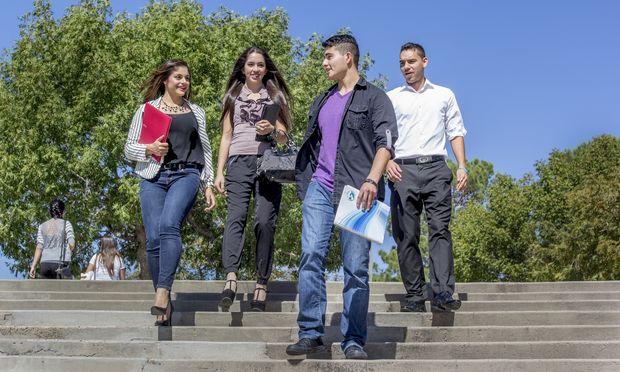How one community college is changing the landscape of western Texas
Students attend El Paso Community College.
El Paso Community College in western Texas sits right on the border between the US and Mexico. It attracts a lot of Hispanic students, a lot of first generation college students and a lot of people from economically disadvantaged backgrounds.
It has also been attracting national attention. In 2015, EPCC was named one of 10 finalists for the Aspen Prize, an award recognizing community college excellence.
EPCC President William Serrata is a first-generation college graduate. He was the first out of his family of four to earn a degree, and he used his experience to help his younger siblings go through the higher education system. Serrata is nothing if not intimately acquainted with the difficulties EPCC students face.
“We’re an 85 percent Hispanic institution, and 70 percent of our first-time college students are first-generation college students, so mom and dad didn’t have the opportunity and don’t have the knowledge. We really need to build that college knowledge and it’s so much more than test scores. It’s understanding the system of higher college education. It’s seeing yourself as a college student. And we begin that process with kindergartners. We adopt elementary schools, we develop that college-going culture, so that they understand that the expectation is that they will go to college,” Serrata says.
El Paso, population 833,000, is a poorer-than-average community. More than 80 percent of the population is Hispanic, and 23 percent live below the poverty level. On average, people earn 75 cents for every dollar earned in the rest of the US. Serrata, however, believes his institution plays a vital role in making El Paso a better place to live.
“The national data is very clear — the more you learn, the more you earn, and the less likely you are to be unemployed,” Serrata says, “These students, as they move forward into the workforce, their (associate) degree at every level increases earnings and also the things you can’t put a price tag on to a large extent. The more educated an individual is, the more likely they are to be involved in community service, the more likely they are to vote, the more likely they are to be involved with their children, they’re healthier — the data is very clear on this — the less likely they are to utilize social services, the more productive they are, and the more they add to the tax base. There’s just so much value in increasing the education attainment level.”
Serrata, however, doesn’t see EPCC as a lone fighter in El Paso. He tries to work closely with the local K-12 and university systems.
“My competition isn’t another institution of higher education. My competition is procrastination and apathy. We only see 61.5 percent of our high school graduates go to college, any college. And so we want to increase that number,” Serrata says. “The goal becomes, if they start at the college, the associate’s degree, they then move forward to the university to receive a baccalaureate degree.”
Serrata’s emphasis on collaboration seems to be working. Some 64 percent of all students that attend the nearby University of Texas El Paso (UTEP) come from EPCC. And a whopping 74 percent of UTEP baccalaureate degree earners have an El Paso Community College credit somewhere on their transcript.
“We really understand that in order to increase the quality of life of this region, we have to increase the education attainment level,” Serrata says.
This story first aired as an interview on PRI's The Takeaway, a public radio program that invites you to be part of the American conversation.
The story you just read is accessible and free to all because thousands of listeners and readers contribute to our nonprofit newsroom. We go deep to bring you the human-centered international reporting that you know you can trust. To do this work and to do it well, we rely on the support of our listeners. If you appreciated our coverage this year, if there was a story that made you pause or a song that moved you, would you consider making a gift to sustain our work through 2024 and beyond?
